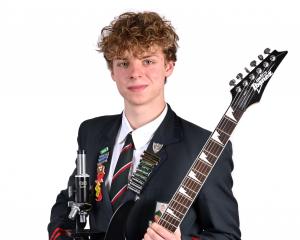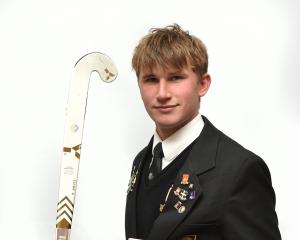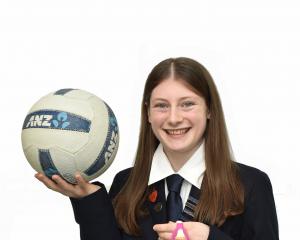
A world in which artificial intelligence (AI) may be calling the shots is a common concern held by Class Act 2013 recipients.
But they also see AI’s benefits.
Each year, the Otago Daily Times catches up with awardees from Class Act a decade earlier, asking them how their lives are going and if they are still pursuing the dreams, interests and hobbies they had in their last year at secondary school.
This year, we sought their views on how AI might affect their lives, and what their hopes and fears are as they creep a little closer to their thirties.
With a general election just weeks away, we also asked what they thought the most pressing issues facing the country are.
So, what is preying most heavily on their minds?
As well as AI, the mounting climate crisis over the next few decades is high on that list, as are concerns about the economy, the cost of living, housing, and the state of the health sector.
The annual ODT Class Act awards recognise excellence in a variety of areas, from academic ability to distinction in sports and cultural activities. The 2013 recipients are now aged between 25 and 28.
When it comes to AI, many view it as potentially a force for good rather than bad, even though they say it is likely to significantly affect their careers.
Auckland actor and production manager Samantha Shannon (Bayfield High) thinks there are plenty of ways AI can be used in the creative industries she works in.
‘‘It would be nice for AI to do the more mundane parts of a job, [but] I do worry that the focus of AI is already more about profit than adding to our wellbeing. It kind of seems like a new fuel source for capitalism.’’
Gavin Stark (Blue Mountain College), who plays professional rugby in France, says he would be concerned if people relied too much on AI and it affected human intelligence, while Dunedin musician and radio programme director Dave Borrie (Cromwell College) says: ‘‘I’ve seen Terminator, I know how this story goes.’’
Tom Kelk (John McGlashan College), who plays in the successful indie rock band Mild Orange, thinks AI could ‘‘go either way’’.
‘‘As long as it is controlled appropriately, it could be very useful. I do, though, have some concern about its effect on the music industry and how it can bend the interpretation of creativity and intellectual property.’’
Emily Gordon (Queen’s High), a data science fellow at Stanford University in California, believes AI will be a positive force in her life.
‘‘My PhD research has focused on adapting AI methods for increasing our understanding of the Earth’s climate system. This experience has left me with an appreciation for the power of AI for the nebulous concept of ‘good’ and that I strongly believe in the good intentions of those implementing AI methods.
‘‘I am looking forward to having my AI companion feed me Bluebird salt and vinegar chips in my retirement.’’
Matthew Scadden (Logan Park High), working in a diplomatic role in the New Zealand High Commission in Apia, sounds a warning that AI could ‘‘massively increase the risk of human extinction this century, even overtaking other more salient issues, such as climate change’’.
‘‘Any technology that has such a high proportion of experts raising concerns about extinction risks needs proportionally drastic safeguards. In my view, the world isn’t well prepared for this challenge.
‘‘Until we see breakthroughs in the field of AI alignment, we need to treat this stuff at least as seriously as we do things like chemical and nuclear weapons.’’
On a lighter note, Rhys Bayly (Otago Boys’ High) believes only some interpersonal skills will be hard to replace with AI.
‘‘It’s already helped reduce some mundane tasks and will continue to help create efficiencies. I attended a wedding recently where the groom used it to write his vows.’’
- Bayfield High School
- Blue Mountain College
- Columba College
- Cromwell College
- East Otago High School
- Gore High School
- John McGlashan College
- Kaikorai Valley College
- Kavanagh College
- King's High School
- Logan Park High School
- Maniototo Area School
- Mount Aspiring College
- Otago Boys' High School
- Otago Girls' High School
- Queen's High School
- Roxburgh Area School
- St Hilda's Collegiate School
- St Kevin's College
- St Peter's College
- South Otago High School
- Taieri College
- The Catlins Area School
- Tokomairiro High School
- Waitaki Boys' High School
- Waitaki Girls' High School
- Wakatipu High School
When it comes to next month’s general election, inequalities bother some of the 2013 recipients.
Surveyor Mick Lister (East Otago High) believes the cost of living and law and order are the most pressing issues.
‘‘These both have the same root causes - inequality.’’
Kelk (John McGlashan College) agrees that inequality is a big problem, ‘‘whether that be social, financial, racial or gender’’.
Injy Johnstone (Kaikorai Valley College), who is based at the University of Oxford and researching how the world can reach net-zero carbon emissions, says the biggest issue is, and has to be, climate change.
‘‘It is not only an issue that will have a profound impact on our lives, but also shows that the [political] party is capable of long-term thinking that can truly resolve issues.’’
Queenstown investment analyst Liam Donnelly (Kavanagh College) says it is important all parties commit to battling climate change and Jasmine Seifert-Simpson (Logan Park High), a chemistry patent examiner in Wellington, calls the climate crisis an ‘‘existential threat to humanity and our way of life’’.
‘‘We literally can’t continue living the way we are without massive changes.’’
Jibi Kunnethedam (St Kevin’s College), a doctor at Dunedin Hospital, has strong words about New Zealand’s struggling health system, which ‘‘requires some significant investment, not just a quick patch or rebranding’’.
‘‘This investment must reach our frontline staff. Expecting our health system to survive on the goodwill of our doctors, nurses and allied health staff, who I see going above and beyond every day, is incredibly short-sighted. We’re starting to see the impact of our staff feeling undervalued, unappreciated and overworked.’’
The range of work pursued by 2013 recipients and their interest in leadership and community service of all kinds has continued into their adult lives.
Hawke’s Bay emergency department doctor Katie Mulholland (Columba College) is competing in the Clipper Round the World Yacht Race. Sea sickness, sleep deprivation and extreme weather are all be part of the 11-month, 44,000 nautical mile journey, as are weeks at sea between ports. Mulholland is a crew member and team medic for the Our Isles and Oceans charity.
Some of the Class Act group are involved in research at the world’s most prestigious universities. Tim Chisholm (Otago Boys’ High) works at the University of Cambridge, where he hopes to develop a diagnostic test for Parkinson’s disease.
Thomas Galbraith (Waitaki Boys’ High) designs control electronics for satellite propulsion systems and Scadden’s (Logan Park High School) partner and fellow Class Act 2013 recipient Hannah Grant (Taieri College) is also in Apia, working in schools and at the local Unesco office.
Sarah Lindsay (East Otago High) and Maddie Blackler (Waitaki Girls’ High) are both making their way in the male-dominated mining industry: Lindsay operates 300-tonne dump trucks while Blackler became a supervisor at the age of just 25.
Others are deeply involved in the performing arts. Victoria Boult (Wakatipu High) looks after drama and comedy television shows for Great Southern Television. As an independent screenwriter and director, she and a colleague recently received $1.5 million to turn their 2022 TikTok series into a TV show.
‘‘Every now and then I have to stop, take stock and realise that I’m living 15-year-old Victoria’s dream life,’’ she says.
Many of the group described adventures shared with their friends. Ed Davies (John McGlashan College) and a former classmate completed a 250km ultramarathon in the Sahara Desert, regarded by many as the toughest foot race on Earth.
Jessica Bailey (Mount Aspiring College) spent two seasons working as a sea-kayak guide on the Antarctic Peninsula and Lucy Pringle (Tokomairiro High) took part in the Mongol Rally, driving overland from London to Mongolia with three friends in a 999cc Toyota Yaris.
Tōrea Scott-Fyfe (Queen’s High) and her friends completed a 100-day traverse of the Southern Alps, from Arthur’s Pass to Fiordland, while Claudia Dodds (Catlins Area) and her partner manage an alpine hut in Austria, looking after grazing cows and serving beer, meat and cheese to passing hikers.
Lister (East Otago High) helped organise a charity ball to raise funds for the East Coast Relief Fund, while Bayly (Otago Boys’ High) volunteered in Ecuador and has had governance roles with not-for-profit organisations.
This year's class acts
The Otago Daily Times Class Act awards began in 2000 to celebrate the excellence of young people in the South.
This year’s recipients will receive their awards from Prime Minister Chris Hipkins in Dunedin on Wednesday.












